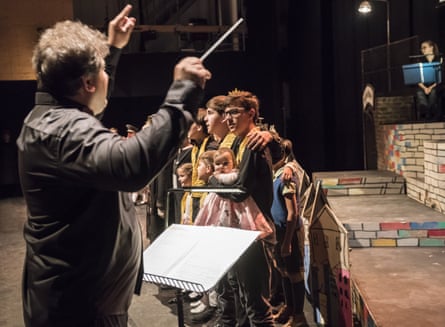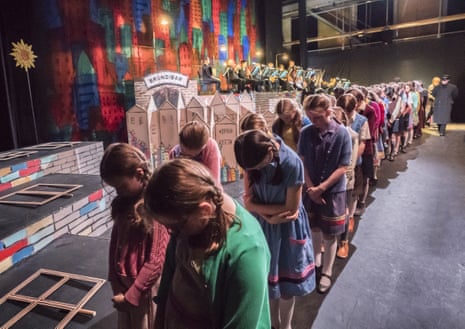Welsh National Opera saved its mightiest blow, as touching and joyful as it was painful, until last. Brundibár (1938), a children’s opera about a mean organ grinder, was the culmination of WNO’s Freedom season, its summer exploration – through opera – of human rights. A crowd of 10- to 18-year-olds, members of WNO’s terrific youth opera, performed the short, exuberant work with two different casts in three performances. Directed by David Pountney, it is his last new production as artistic director of WNO, which he leaves at the end of August. Moreover, and poignantly, Brundibár was the final piece written by the Jewish Czech composer Hans Krása before his arrest by the Nazis.
Krása was sent to Theresienstadt (Terezín), the transit camp-ghetto north of Prague. Between 1943 and 1944 the opera was given some 55 performances there. Photos and footage of the production, used in a propaganda film, have survived. We know the faces of those children. Most of them, and Krása too, were murdered in Auschwitz in 1944. Those are the bare facts. There are many stories within stories of friendships, farewells, miraculous escapes of those first performers. WNO Youth Opera, as well as rehearsing the piece to a superb standard, were steeped in the context of its composition via talks and workshops over recent weeks. An exhibition in the foyer of Cardiff’s Millennium Centre charted some of the memories.
Without question this greater understanding fed into their performance, heartfelt and committed. At the start they marched in, heads down, chillingly obeying a guard’s whistle. Bethany Seddon’s picture book designs and cheerful costumes, simple but effective, underlined the work’s good-over-evil fairytale element. In the Sunday matinee performance I attended, the assured soloists included Alfie Jones, Manon Thomas, Megan Jones, Gracie Jones and many more promising young stars. The adult ensemble of 14 musicians, a ramshackle mix (matching Krása’s players in Terezin) of strings, trumpet, flute, clarinet, accordion, guitar, piano and percussion, played with idiomatic charm: now jazzy, now with sweet-sour echoes of Kurt Weill and folk and klezmer.
All this would be overwhelming enough. Yet other remarkable elements cast darkness and light on WNO’s staging. The company’s music director, Tomáš Hanus, is the son of one of the original Brundibár children in Terezín. His mother, Anna Hanusová-Flachová, was among the few survivors. After the performance, Hanus spoke briefly of his tears on opening the score of Brundibár, acknowledging that but for a chance circumstance he would not be here. Nor, he said, would his children – eight in all, from babe in arms upwards, who like a set of Russian dolls (but far more spirited and independent) left their seats in the audience and joined their father, and the company, on stage for the redemptive Brundibár finale, as an encore.

Then a surprise guest took to the stage. Ninety-year-old Ellen Davis, born Kärry Wertheim, left Germany with the Kindertransport in 1939, aged 10, and has since made her life in Wales. How is she called “lucky”, she asked, when for 80 years she has mourned the mother, brothers and sisters she lost. She spoke of how such events go on, the world over. Her final words, frail with emotion, repeated until she was helped back to her seat, threw down a gauntlet: “Do something.”
Cardiff had been in the spotlight all week, for BBC Cardiff Singer of the World 2019. From a partial encounter of the heats and finals, 31-year-old Ukrainian baritone Andrei Kymach was a deserving winner, with the English soprano Katie Bray and the Chinese tenor Mingjie Lei popular audience prize and song prize winners respectively. They have promising futures, as past victors have proved, from Karita Mattila at the inaugural competition in 1983 to Ben Johnson, Jamie Barton and Louise Alder recently. For many TV viewers in 1989 it was their first encounter with the Welsh bass-baritone Bryn Terfel, who won the lieder prize that year.
With happy synchronicity he is currently, magnificently, singing the title role in Mussorgsky’s Boris Godunov at the Royal Opera House. This first revival of Richard Jones’s bold, rare, effective production has a predominantly British cast, insightfully conducted by Marc Albrecht. All the ingredients are right. Go if you can. It’s a rare chance to see the darkly raw, original 1869 version. Unaccountably there are still tickets.
And on the question of ROH revivals, The Marriage of Figaro is coming up, with a strong cast conducted by John Eliot Gardiner, while Carmen, in Barrie Kosky’s daring, confrontational and spectacular staging, is almost worth fighting a bull for. In the first of two casts, conducted by Julia Jones, the French mezzo-soprano Anaïk Morel is sultry and haughty in the title role, with Bryan Hymel her stolid but vocally heroic (after a faulty start) Don José, Luca Pisaroni a sleek Escamillo and Ailyn Pérez in glorious voice as Micaëla. Carmen is broadcast on open-air big screens on Tuesday, with Aigul Akhmetshina as Bizet’s Gypsy heroine. It could be a hot one.
Star ratings (out of five)
Brundibár ★★★★★
Boris Godunov ★★★★
Carmen ★★★★
Boris Godunov and Carmen are in rep at the Royal Opera House, London, until 3 July and 20 July respectively

Comments (…)
Sign in or create your Guardian account to join the discussion